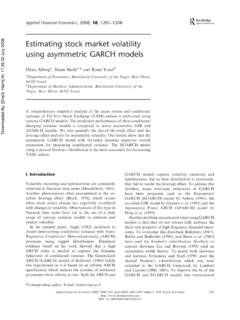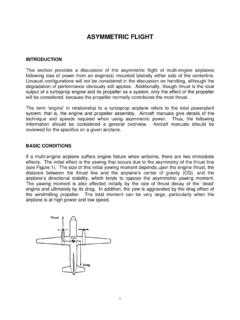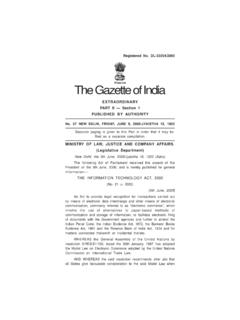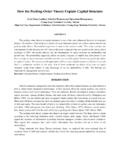Transcription of Bargaining with Incomplete Information - Ausubel
1 Bargaining with Incomplete Information Lawrence M. Ausubel , Peter Cramton, and Raymond J. Deneckere*. June 2000. JEL No.: C78 ( Bargaining Theory), D82 ( asymmetric and Private Information ). Keywords: Bargaining , sequential Bargaining , Incomplete Information , asymmetric Information , private Information , Coase Conjecture Send comments to: Lawrence M. Ausubel Peter Cramton Raymond J. Deneckere Department of Economics Department of Economics Department of Economics University of Maryland University of Maryland University of Wisconsin College Park, MD 20742-7211 College Park, MD 20742-7211 Madison, WI 53706.
2 *The authors gratefully acknowledge the support of National Science Foundation grants SBR 94 10545, SBR 94 22563, SBR 94 23104 and SBR 97 31025. Bargaining with Incomplete Information Lawrence M. Ausubel , Peter Cramton, and Raymond J. Deneckere 1 Introduction A central question in economics is understanding the difficulties parties have in reaching mutually beneficial agreements. Why do labor negotiations sometimes involve a strike by the union? Why do litigants engage in lengthy legal battles? And why does a worker with a grievance find it necessary to resort to a costly arbitration procedure?
3 In all these cases, the parties would be better off if they could settle at the same terms without a protracted dispute. What, then, is preventing them from settling immediately? Recent theoretical work in economics has sought to answer this question. Although the theory is still far from complete, researchers have taken promising steps in modeling Bargaining disputes by focusing on the process of In the theory, costly disputes are explained by Incomplete Information about some aspect critical to reaching agreement, such as a party's reservation Informational differences provide an appealing explanation for Bargaining inefficiencies.
4 If Information relevant to the negotiation is privately held, the parties must learn about each other before they can identify suitable settlement terms. This learning is difficult because of incentives to misrepresent private Information . Bargainers may have to engage in costly disputes to signal credibly the strength of their Bargaining positions. In this chapter, we provide an overview of the theoretical and empirical literature on Bargaining under Incomplete Information . Since the literature on the topic is vast, it was inevitable that we had to limit the scope of our discussion.
5 Consequently, a number of interesting and important contributions were left out. In particular, we would have liked to have had space to discuss the work on repeated Bargaining ( , Hart and Tirole, 1988; Kennan, 1997; Vincent, 1998), and the extensive literature on durable goods monopoly (studying such topics as the impact of depreciation and increasing marginal cost of production, the effect of secondhand markets and transactions cost, and selling versus leasing contracts). 2 Mechanism Design We begin with an analysis of the fundamental incentives inherent in Bargaining under private Information .
6 For this, we abstract from the process of Bargaining . Rather than model Bargaining as a sequence of offers and counteroffers, we employ mechanism design and analyze Bargaining mechanisms 1. See Binmore, Osborne and Rubinstein (1992), Kennan and Wilson (1993), and Osborne and Rubinstein (1990) for surveys. 2. Other motivations for disputes have been presented, such as uncertain commitments (Crawford, 1982) and multiple equilibria in the Bargaining game (Fernandez and Glazer, 1991; Haller and Holden, 1990).
7 1. as mappings from the parties' private Information to Bargaining outcomes. This allows us to identify properties shared by all Bayesian equilibria of any Bargaining game. One basic question is whether private Information prevents the bargainers from reaping all possible gains from trade. Myerson and Satterthwaite (1983) find that ex post efficiency is attainable if and only if it is common knowledge that gains from trade exist; that is, uncertainty about whether gains are possible necessarily prevents full efficiency.
8 Our development of this result follows several papers in the implementation literature (Mookherjee and Reichelstein, 1992; Makowski and Mezzetti, 1994; Krishna and Perry, 1997; and, especially, Williams, 1999). Consider an allocation problem with n agents. Agent i has a valuation vi(a,ti) for the allocation a A. when its type is ti Ti. An agent's type is private Information . There is a status quo allocation, a! , defining each agent's reservation utility. We normalize each vi such that the reservation utility vi ( a!)
9 , ti ) = 0 . Utility for i is linear in its value and money: ui(a,ti,xi) = vi(a,ti) + xi, where xi is the money transfer that i receives. A mechanism a,x determines an allocation a(r) and a set of money transfers x(r) based on the vector r of reported types. We wish to determine if it is possible to attain efficiency (for all t) by a mechanism that satisfies the agents' incentive and participation constraints. Let Ui(ri|ti), Vi(ri|ti), and Xi(ri) denote i's interim utility, valuation, and transfer when i reports ri and the other agents honestly report t i: U i (ri |ti ) E t i [ui (a (ri , t i ), ti , xi (ri , t i ))].
10 Vi (ri |ti ) E t i [vi (a (ri , t i ), ti )]. X i ( ri ) E t i [ xi (ri , t i )]. Then Ui(ri|ti) = Vi(ri|ti) + Xi(ri). Let Ui(ti) Ui(ti|ti). The mechanism is incentive compatible if honest reporting is a best response: Ui(ti|ti) Ui(ri|ti) for all ti,ri Ti. Assume that ti has a positive density fi on an interval support [ t i , ti ], and that Vi(ri|ti) is continuously differentiable. Then from the Envelope Theorem, incentive compatibility implies for almost every ti Ti dU i (ti ) U i (ri = ti | ti ) Vi (ri = ti | ti ).





